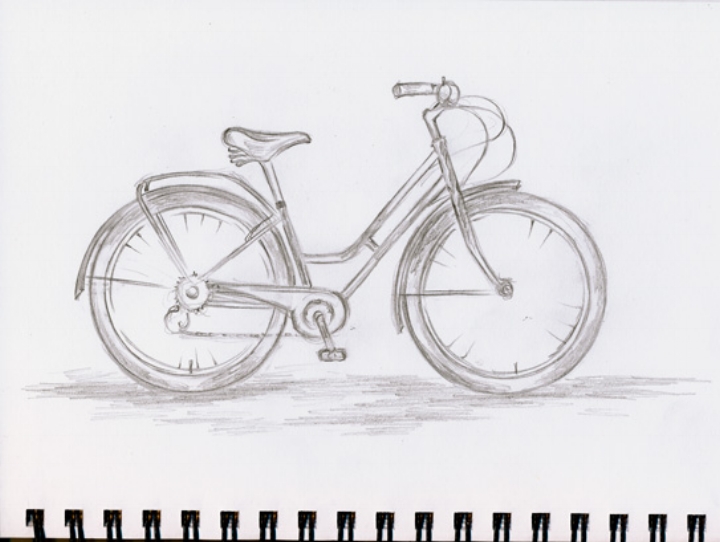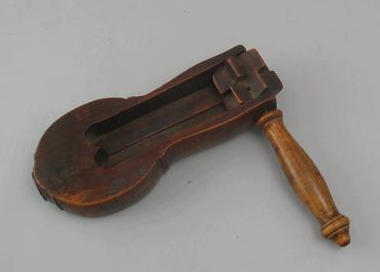Watford: a name to strike indifference into the hearts of Wolves supporters – at least until 7 April 2019. Yet it wasn’t always thus: there was a time when it provoked sheer ignorance. Our first meeting came in the FA Cup in 1912, and I remember, as the Loyal and Distinguished Pedallers gathered outside the Molineux Hotel before embarking on our journey to their Cassio Road ground, a number of cyclists wondering whether to turn left or right on Waterloo Road Eli Aldridge led the way on his spanking Sunbeam, and we were soon finding our voices in the cold winter air.
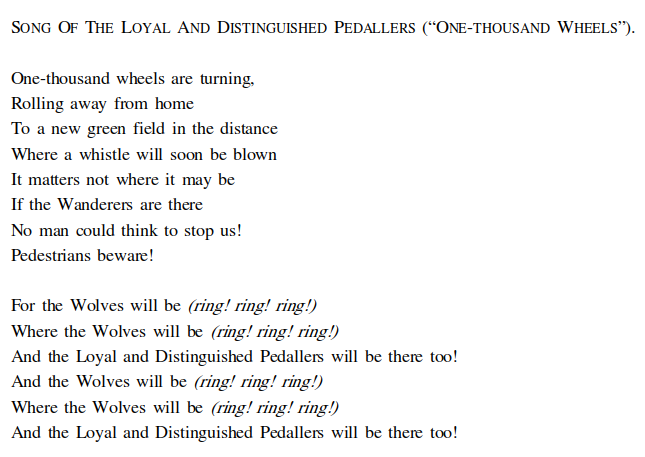

Whenever I was out with the Pedallers, I felt a wistfulness on singing that second verse, and the line “Away from the women who love them…”. I would always wonder if anybody actually loved me, in Whitmore Reans or elsewhere, and think of someone in my secret admiration, imagine them sending me off to West Brom, Derby or Notts with a kiss and a silent vow that she would wait for me, a tender parting priming joyous return. My mom had waved me off on the first couple of trips but I’d asked her not to do that anymore.
It took a while to get going, past coal carts and omnibuses through the Black Country and Brum, but once we were out into the leafy south of Solihull, chilled wind blowing at our faces (caps secreted to the inside pockets of overcoats) it felt good to be alive, but for the bad chest I’d picked up the previous week. We stopped in Stratford-upon-Avon just as an ale-house was opening, warmed ourselves by a fire and spoke of our expectations for the game. Knowing nothing of the opposition, most expected a win. “Halligan for a hat-trick,” Amos Graves pronounced confidently, after his first deep visit to the foam, “And Peers won’t let a single one past.”
A huddle of Cowsheders including Arnold “Healthy” Johns and Eric Broad were less optimistic, arguing that Jack Addenbrooke had taken the club as far as he could. Amos, a large man, was disparaging of such attitudes; a heated debate ensued and then, being reminded but once of the Loyal and Distinguished Pedallers’ moral code, both parties shook hands sincerely before our journey to Hertfordshire resumed, through a placid if rather stark landscape, the cawing of crows the only accompaniment to our songs and chatter.

When the clear skies started to darken, we stopped in a village south of Banbury called King’s Sutton, arranged things with a farmer, pitched our tents in his field and headed to the local, the White Horse. The ale there was as deep and malty as anything I’d ever tried, and the fire roared. A balladeer sang in the corner over a guitar.
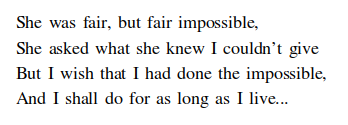
but the Pedallers soon drowned him out. After exchanging a few pleasantries with the locals, talk switched to what people had been up to over the Christmas period and some technical questions (having already drawn envious glances, Jeb Grand’s new bicycle clips now occasioned fervent interrogation), before inevitably arriving at the next day’s game. Amos Graves was even more bullish than he’d been in Stratford, predicting a double hat-trick for Halligan and Peers to score first.
“Y’am never roit, Amos,” said Eric Broad, his scratchy alto reaching out over the deep chatter, “If yow car see Jack Addenbrooke’s toim has come, yow now nuthin’ about football.”
“He took us to Crystal Palace three years ago,” boomed Amos, his tenacious baritone hushing the public bar completely, “And he’ll teck us there this year, if people will just get behoind him!”
“We’m behoind him,” countered Arnold Johns, pushing ahead of Eric and well into Graves’ personal space, “But we’m behoind the Villa, too. And Bury! If we manage to beat this Watley lot…”
“Watford.”
“Whatever they’m called, please God we don’t meet Stafford Road in the next round, for I swear they’d probably beat us!” Boos and whistles rang out at the invocation of our rivals.
“Bleeding Christ on a stick!” boomed Amos, “I didn’t talk come all this way to talk about that God-forsaken lot!”
Having just brought another jug of chestnut-coloured ale up from the cellar, the Landlord silenced the room with an authoritative bass, “Gentlemen! I shall not bear the Lord’s name be used in vain in my house! My custom is to give but one warning!”
“Miss,” I said, quietly, “Will you not speak to me? My name is Gonby, and I am from Wolverhampton, Staffordshire.”
My last fag had irritated my chest a bit and, setting down my pint on the stone mantel, I headed outside to relieve myself in the gutter. Upon doing so I looked up to see a pretty maid across the street; having evidently been alerted by my desperate hawking, she was looking straight at me, and it felt as though I could wait a lifetime for her countenance to break into a smile. Instead, however, she turned away and hastened on her journey. I was dazed for a few seconds but eventually came to life and ran up the hill after her.
“Excuse me,” I called, “Miss! My lady!”
She would not turn around. I sprinted now to get twenty yards ahead and turned to see that face once more, glowing in the moonlight. But the head I adored soon bowed and I was lost again. “Miss,” I said, quietly, for we were now some distance from the rabble in the pub, “Will you not speak to me? My name is Gonby, and I am from Wolverhampton, Staffordshire.”
She opened her lips, and it was as though all the birds of the fields had mistaken moonlight for dawn, “I am pleased to make your acquaintance, sir,” she said, in sweet country tones that suggested innocence and good, simple breeding. But the answer was one of manners rather than sincerity, and I was bruised again.
“But what acquaintance is this?” I asked, “that knows but one direction? Since I saw you, knowing you has been my life’s breath, yet you would have me only exhale.”

She blushed deeply, and then turned around. At the bottom of the hill the landlord of the White Horse was heaving Amos Graves out of the door, to loud shouts of approbation and censure from the rest of his customers.
“Bugger your sweet Jehovah!” shouted Amos at the frosted glass, “And bugger his holy ghost!” At that he set forth towards us – or towards me, as when I turned around from the spectacle the girl was no longer to be seen. I dashed about a little, looking for a sign of her in the dark, but she was gone.
“Any pubs up here, Gonby?” asked Amos as he reached the top.
“No,” I said glumly.
“What’s the matter?”
“A maiden,” I replied. It didn’t seem to capture the enormity of what had transpired.
“About time, too,” said Amos, a father of seven, and we headed off to our campsite, each disconsolate for his own reason.
After a sleepless night I arose to dense, cloudy skies at the sound of the first sparrow and headed to the farmer’s dwelling. Purchasing some leaves of letter paper and a pencil from the lady of the house I headed out to the square to dedicate myself to a portrait of the pretty maid by which I could enlist the help of the villagefolk in identifying her. The White Horse had opened by the time I’d finished, and I began my enquiries there. The landlord didn’t know her but suggested I try at the small store two doors down; those questions, too, yielded no answers. I stopped strangers to no avail, and a policeman with an unsightly moustache had questions of his own regarding a man of heft with a Godless tongue. Then I saw Jeb Grand.
“We’m about to head out, Gonby,” he said. “Amos has packed your tent away.”
And then I said the words I had once thought I should never say: “I don’t think I can make it to today’s game.”
“What yow on about?” asked Jeb.
“Just leave my tent in the field, Jeb. I’ll kip there again tonight.”
“Gonby, we am the Loyal and Distinguished Pedallers. Emphasis on ‘Loyal’, if you take my meaning….”
“I know, Jeb; I know. Amos will understand.”
Healthy shook his head and followed Amos down the hill, and my heart hurt to see them leave, as if they took with them all of my past days.
In fact Amos did not understand, and within ten minutes his red face was bouncing up the square like a bobbing apple, alongside Healthy Johns, their differences regarding the management style of Jack Addenbrooke resolved, forgotten, or put to one side while the Gonby issue was addressed.
“It’s not how we do things, Gonby – just quitting like this.”
“I have to find this woman, Amos.”
“You have to ride with the Pedallers,” countered Johns, “That’s a duty as well as a privilege.”
I didn’t like Healthy’s tone, and navigated it quickly.
“How did you meet your wife, Amos?” I asked, offering each a Craven ‘A’.
There followed a dull and rather complicated story involving a fishmonger’s on Horseley Fields and some kind of wager with a tinker passing through Ettingshall. Healthy Johns’ eyes soon glazed over, and I had to fight the urge to sit down in the gutter while I listened. But the tactic had its desired effect: the retelling softened the old man’s heart so that, having completed his tale, he looked into my eyes and said, “And I can see you am resolved to follow the heart’s path this weekend. We shall rejoin you here tomorrow morning.” Healthy shook his head and followed Amos down the hill, and my heart hurt to see them leave, as if they took with them all of my past days.
I knew I had to make the most of the time I had stolen.
After another hour stopping strangers in the street, I began knocking on random doors north of where I had last seen her. Responses to my sketch were varied, with one old man suggesting the name of Mr. Asquith’s late wife and another likening it to Emmeline Pankhurst. One old chap in a crumbling cottage thought it was supposed to be Queen Victoria and a woman three doors down from him suggested Prince Albert. An old hag who couldn’t tell me the name confidently predicted that if I were to ever cross such a woman those I loved the most in the world would all disappear. I was unsure whether to doubt my own artistic abilities or the sanity of King’s Sutton’s residents when suddenly I saw my model in absentia depart from the gate to a smallholding at the very top of the street; I darted up and caught up with her by a large dog turd at the limits to the village.
“Have you heard said, sir, that football is like a religion?” “Of course,” I replied, “Jack Dudley invented that saying.”
“My lady! I have found you!”
“Sir, I am not your lady.” At this, all the sadness of the world fell upon my shoulders. I remembered it was winter and cruel cold bit at my heart.
“You belong to another, madam?”
“Another man, no,” she said.
My eyes widened. “Another woman?”
“Another team, sir.”
There passed five seconds of silence.
“A team of men, m’lady, or a team of women?”
She shot me an angry look, but seeing my genuine confusion took pity. “Have you heard said, sir, that football is like a religion?”
“Of course,” I replied, “Jack Dudley invented that saying.”
“Do you abide by it?”
I gave the question some thought. “Jack Dudley says a lot of things when he’s drunk,” I replied, scratching my unshaven cheek, “I suppose that has more sense to it than some of his claptrap.”
“My late father, God bless his soul, was from Staffordshire, too. The way you speak recalls him strongly to me,” she smiled wistfully at this, and my heart leapt, albeit briefly, “But he brought me up to support another team, and I would expect my husband to follow it too, just as an Anglican might take full communion were he to fall in love with a Catholic….”
It was the first time a woman had ever spoken directly of love to me and it made me feverish. Was this it? Was my life taking a course at this moment that would change it forever? As if sensing my excitement and seizing the initiative she looked into my eyes and I felt I was under her total enchantment. At that moment anything seemed like nothing, if it would make her happy, make her mine….
“Follow the Baggies, you mean?” I blurted out, “Sure! No problem!”
She shook her head. What a beautiful head it was: the slightly upturned nose, the noble sadness to the mouth and eyes, the way the single dark ringlet fell upon it when it looked downwards. Oh to make it happy! Could any sacrifice be too great?
“My father was a railway engineer,” she began.
This was not promising.
Her words proceeded, via a clumping, downhill path, to a conclusion I could not bear to hear. Cruel fate, they call it. I felt the tragic descent as if it were footsteps through my being: first the mind, stunned by its own reason; then the heart; now the lower intestines urgently responding; now the knees, weak, longing to go but rooted.
“My father was a railway engineer,” she began. This was not promising.
“I would bring you happiness, Mr. Gonby; and I would bear you children. I would be as faithful and true a wife as ever there has been. I would do all this and more for you, and you would have to do but one thing…”
“Sorry, Bab,” I said, “that’s never going to happen. For…
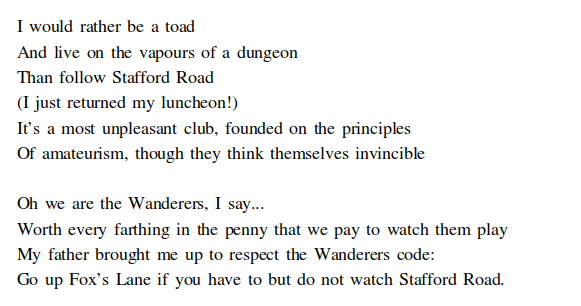
So impassioned was my singing of the Hymn To Partiality and Professionalism (“Every Farthing In the Penny”) that I had closed my eyes for the refrain, and when I opened them, not only had she gone, but Constable Dawes had appeared, his jowly face prickled from a morning shave (sadly he had once again missed that bit above the lip). “What’s all this racket at half past two in the afternoon?” he asked.
“Where did the lady go?” I asked.
“I saw no lady – just a fool baritone with no respect for the peace. Where are the others in your confederacy?”
“Watford, by now,” I said, sadly, the impact of my choices finally dawning on me. “How doting I have been!”
“A woman, was it?” he asked sympathetically. I nodded my head and he looked at me intently before checking his pocket watch. “Come on,” he said kindly, “Take a drink with me for the heartache.”
: : : : :
I awoke the next day with a hammering head, huddled beneath my blanket and unpitched tent. I packed these away and headed to the farmhouse to see if they would give me some sustenance, but they were out – presumably at church. I went back to my field, sat and contemplated my life in the cruel way a hungover person will do if left in solitude, but it wasn’t too long before I heard singing coming from the wooded copse through which the road to Watford ran.

I arose and headed to the hedgerow to greet them, but doing so could not believe my eyes. One thousand wheels were turning, but there were no men atop the well-oiled machines. I watched in amazement as the riderless cycles whizzed past me, led by Eli Aldridge’s brand-new Sunbeam. Confused and panicked, I put my bag onto my back and peddled after them; on reaching them I could make out the different voices: Amos Graves’ baritone, Eric Broad’s scratchy alto…, the tuneless croak of Jeb Grand. On they went, not stopping for drinks, all the way back to Solihull, from which point the occasional cycle would break off on a different route north; this continued all through the Black Country, and by the time I reached the Molineux Hotel there was nobody with me.
No news ever emerged as to what had happened to them; Jack Dudley, who’d travelled to the game with the Flying Squadron assured me he’d spoken to Amos Graves and Eli Aldridge at the Cassio Road ground. I thought of the old lady who’d warned me that those I most loved would disappear if I did not honour the wishes of the woman in my portrait — had I caused their disappearance? Was this impossible woman a woman at all, or some spectral apparition that had brought evil upon me? I feared that I might never enjoy the Wolves with the feelings of guilt and loss I now carried.
Such fears turned out to be groundless. I was as pleased as anyone when we won the replay 10-0 later that month, and by the spring I was cycling to away games with the Honorable and Worthy Pedallers, a splinter group formed some years before by cyclists intolerant to Amos Graves’ taste in profanities.
